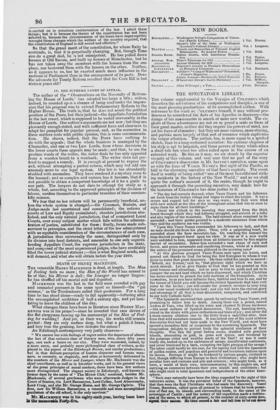IV. THE SUPREME COURT OF APPEAL. The author of the
" Observations on the Necessity of Reform- ing the House of Lords," has adopted too large a title ; unless, indeed, he counted upon a chance of being read under the impres- sion that his proposal was to extend Parliamentary Reform to the Higher House. The truth is, that he does not assail the political position of the Peers, but their judicial—the Appellate Jurisdiction in the last resort, which is supposed to be vested irrevocably in the House of Lords. Our author's arguments are not new ; but they are pleasantly enough stated, and with sufficient force and clearness to adapt his pamphlet for popular perusal, and, as the corrective in these matters rests with public opinion, this is some recommenda- tion. He shows, indeed, that the Peers have nothing to do with the appeals ; that the whole business is managed by the Chancellor, and one or two Law Lords, from whose decisions in the lower courts these appeals may be made ; and that, to use the profane words of the writer, the suitor finds he has only appealed from a wooden bench to a woolsack. The writer does not pre- tend to suggest a remedy. It is enough at present to expose the evil, without attempting a partial reform, which may but add one anomaly more to our legal system. Our law is too abundantly studded with anomalies. They have rendered it a mystery even to the learned; and so complex and various has it become, that it is not possible to obtain a competent knowledge of it for a guide to our path. The lawyers do not dare to attempt the study as a whole, but, according to the approved principles of the division of labour, confine themselves to particular branches of their unscien- tific science.
We fear that no law reform will be permanently beneficial, un- less the whole system is changed,—the Common, Statute, and Judge-made law ascertained and consolidated ; the notions of courts of Law and Equity assimilated; obsolete jurisdictions abo- lished, and the only natural jurisdiction, that of competent Local Courts, over every subject matter which falls within the adminis- tration of justice, substituted for them ; finally, forms made sub- servient to principles, and the strict letter of the law administered with an equitable consideration of the circumstances of each case. A jurisdiction thus universally the same, distinguished only by its division into local districts, and amenable to one only superin- tending Appellate Court, the supreme jurisdiction in the state, and composed of the most experienced judges, who have creditably filled the lower judicial stations ;—this is what England needs, and will demand, and what she will obtain before the year 2000.


























 Previous page
Previous page